 |
This report provides an integrative review of 52 recently published research reports that examine the associations between long working hours and illnesses, injuries, health behaviors, and performance. The report is restricted to a description of the findings and methods and is not intended as an exhaustive discussion of all important issues related to long working hours. Findings and methods are summarized as reported by the original authors, and the study methods are not critically evaluated for quality. In 16 of 22 studies addressing general health effects, overtime was associated with poorer perceived general health, increased injury rates, more illnesses, or increased mortality. One metaanalysis of long work hours suggested a possible weak relationship with preterm birth. Overtime was associated with unhealthy weight gain in two studies, increased alcohol use in two of three studies, increased smoking in one of two studies, and poorer neuropsychological test performance in one study. Some reports did not support this trend, finding no relationship between long work hours and leisure-time physical activity (two of three studies) and no relationship with drug abuse (one study). A pattern of deteriorating performance on psychophysiological tests as well as injuries while working long hours was observed across study findings, particularly with very long shifts and when 12-hour shifts combined with more than 40 hours of work a week. Four studies that focused on effects during extended shifts reported that the 9th to 12th hours of work were associated with feelings of decreased alertness and increased fatigue, lower cognitive function, declines in vigilance on task measures, and increased injuries. Two studies examining physicians who worked very long shifts reported deterioration on various measures of cognitive performance. When 12-hour shifts combined with other work-related demands, a pattern of more adverse findings was detected across studies. Six studies examining 12-hour shifts combined with more than 40 hours of work per week reported increases in health complaints, deterioration in performance, or slower pace of work. Two studies comparing 8- and 12-hour schedules during day and night shifts reported that 12-hour night shifts were associated with more physical fatigue, smoking, or alcohol use. Two studies examining start times for 12-hour shifts reported that decrements in alertness or more health complaints were associated with early 6:00 a.m. start times. One study examining 12-hour shifts in hot work environments reported a slower pace of work as compared with shorter shifts. Another study examining high workloads during 12-hour shifts showed increased discomfort and deterioration in performance as compared with shorter shifts. More definitive statements about differences between 8-hour and 12-hour shifts are difficult because of the inconsistencies in the types of work schedules examined across studies. Work schedules differed by the time of day (i.e., day, evening, night), fixed versus rotating schedules, speed of rotation, direction of rotation, number of hours worked per week, number of consecutive days worked, number of rest days, and number of weekends off. All of these factors could have interacted with overtime and influenced study results. Also, some studies did not report how many hours participants worked per week or other details about the work shifts, which complicated the assessment of their results. The many differences in the 8- and 12-hour shift schedules studied may have accounted for their contradictory findings. Few studies have examined related topics, such as the combined influence of shift work and overtime, or how worker control over their work time and mandatory overtime might influence their health. Some studies examined functional abilities or injuries during the 1st to 12th hours of work, but little has been reported about effects after the 12th hour. Few studies have investigated the influence of long working hours on the health and safety of women or older workers. Few studies have explored how long working hours influence workers with pre-existing health problems, or how the hours relate to symptom management and the course of common chronic diseases. Little data are available regarding the influence of occupational exposures (i.e., chemical, heat, noise, lifting) in combination with long working hours on health and safety. Although the number of published studies examining long working hours appears to be increasing, many research questions remain on how overtime and extended work shifts influence worker health and safety.
| Author(s): | Caruso-CC, Hitchcock-EM, Dick-RB, Russo-JM, Schmitt-JM |
| Reference: | U.S. Department of Health and Human Services, Public Health Service, Centers for Disease Control and Prevention, National Institute for Occupational Safety and Health, DHHS (NIOSH) Publication No. 2004-143, 2004 Apr:1-38 |
2004-143 (PDF, 2300 KB)